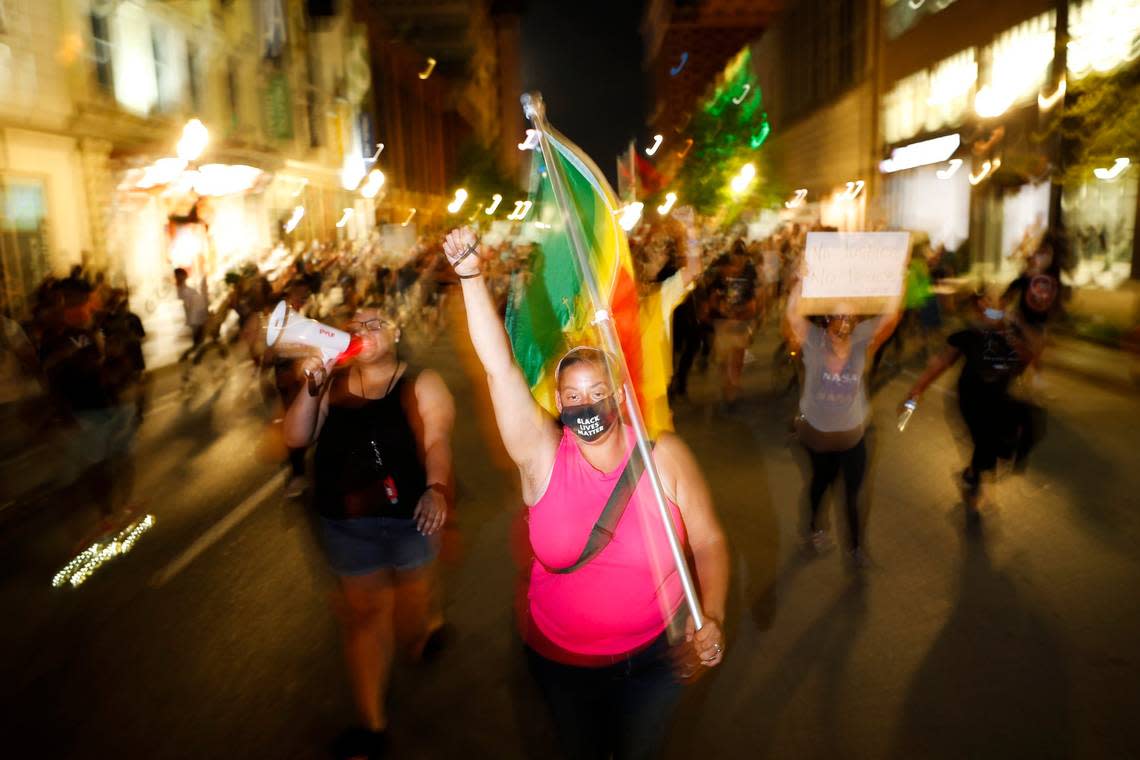As predicted, Lexington protest leader’s trial was a sham. She deserves an apology.
It was predicted and predictable, and lo it came to pass.
Sarah Williams’ sham trial over the Black Lives Matter protests of 2020 came and went, showing itself to be just as big a waste of time and money as this paper and many, many others had described it, so much so that even a jury agreed. ( I was on vacation during the actual event, but think it’s still worth commenting on.)
After a two-day trial, Williams was found not guilty of inciting a riot, resisting arrest and possession of marijuana. She was found guilty of second-degree disorderly conduct, and will have to pay a $200 charge. The fifth charge, possession of drug paraphernalia, was dropped.
County Attorney Larry Roberts insisted on prosecuting Williams on a host of bogus charges despite the fact that as tireless organizers, she and her sister April Taylor kept Lexington’s protests from the destruction we saw in other cities. In other cities, prosecutors dismissed the charges. In Lexington, Larry Roberts doubled and tripled down on his vendetta against the sisters, basically because he didn’t like the way “angry Black women,” as Williams described it, spoke to police in the wake of the murders of George Floyd and Breonna Taylor. In May, the voters of Lexington made it clear how they felt about Roberts’ work when they drummed him out of office in a primary with a whopping loss to former council member Angela Evans who won with 72 percent of the vote.
The trial coverage was riveting because time and again, Williams’ lawyer Daniel Whitley, decimated Roberts’ arguments that Williams was a danger to police and public. He made Roberts look silly and the Lexington Police Department even worse, as though they had conspired to make Williams look bad, but couldn’t quite make it stick. For example, in her arrest citation, they described how they found a “crack-pipe” in her possession. But as the officer later admitted, it was actually a broken vape cartridge.
“Whitley asked if the officer knew that placing “crack pipe” in the citation would be made public,” Herald-Leader reporter Taylor Six wrote. The officer said at the time, he did not know the arrest citation would be subject to the public. “During your training you aren’t made aware that citations are public record?” Whitley replied.
The officer replied, “I know that now.”

Two years wasted
Meanwhile it’s been two years of wasted time and taxpayer dollars. Two years in which the city has implemented many of the reforms that Williams and Taylor have fought for, including a ban on no knock warrants, a permanent commission on racial justice, citizens added to the police disciplinary body, more body cameras for police, and a clearer understanding of the white supremacy that undergirds so many of the power structures in Lexington.
Worst of all, two years of Sarah Williams’ life have been erased, two years where she couldn’t work as a nurse, couldn’t really speak out and felt constantly harassed by police while trying to raise young children.
“The LPD stopped my entire life and I don’t think people realize the level of poverty I’ve had to navigate the past two years,” Williams told me. “I need my life back.”
Patrice Muhammad, former publisher of the Key Newsjournal, Lexington’s only Black newspaper, said prosecutor and police behavior was “egregious” from the beginning in targeting Williams. They weaponized body camera footage, using selective video to make Williams look bad, even to some members of the Black community.
“This was a disservice to the community,” Muhammad said. “It was a waste of our tax dollars and time, and an injustice to Williams.”
Two years later, we are a changed and better community, thanks to Williams and Taylor. As we’ve written before, we should thank them and apologize for everything they’ve had to endure.
It would be folly to expect such thanks or remorse from either the County Attorney’s office or the Lexington police. But at the very least, prosecutors should drop the remaining charges against seven other protesters. Quit while you’re behind as they say, and let’s move forward.
“At the end of the day we have begun to make some shifts in the power structure and that’s the best out of all of this and that work will continue,” Williams said. “But we have to fully acknowledge what brought us to this point, and we haven’t done that.”
As has happened time and again through our history, citizen protesters showed us our errors and pointed a better way forward. As Lexingtonians, we owe them all a huge debt.
